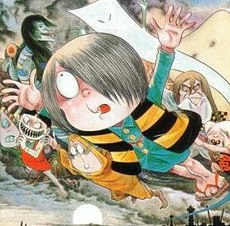Ge Ge Ge no Kitaro
| GeGeGe no Kitarō | |

Kitarō and his yōkai friends.
|
|
| ゲゲゲの鬼太郎 | |
|---|---|
| Genre | Supernatural, Horror, Black comedy |
| Manga | |
| Written by | Shigeru Mizuki |
| Published by | Kodansha |
| Demographic | Shōnen |
| Magazine | Weekly Shōnen Magazine |
| Original run | 1960 – 1969 |
| Volumes | 9 |
| Anime television series | |
| Directed by | Isao Takahata |
| Written by | Masaki Tsuji |
| Music by | Taku Izumi |
| Studio | Toei Animation |
| Original network | Fuji Television (JOCX-TV (Tokyo Tower Channel 8)) |
| Original run | January 3, 1968 – March 30, 1969 |
| Episodes | 65 |
| Anime television series | |
| Directed by | Isao Takahata |
| Written by | Masaki Tsuji |
| Music by | Taku Izumi |
| Studio | Toei Animation |
| Original network | Fuji Television (JOCX-TV (Tokyo Tower Channel 8)) |
| Original run | October 7, 1971 – September 28, 1972 |
| Episodes | 45 |
| Anime television series | |
| Directed by | Osamu Kasai (1-108) Hiroki Shibata (109-115) |
| Written by | Junki Takegami |
| Music by | Masahiro Kawasaki |
| Studio | Toei Animation |
| Original network | Fuji Television (JOCX-TV (Tokyo Tower Channel 8)) |
| Original run | October 12, 1985 – March 21, 1988 |
| Episodes | 115 |
| Anime television series | |
| Directed by | Daisuke Nishio |
| Written by | Shun'ichi Yukimuro |
| Music by | Kaoru Wada |
| Studio | Toei Animation |
| Original network | Fuji Television (JOCX-TV (Tokyo Tower Channel 8)) |
| Original run | January 7, 1996 – March 29, 1998 |
| Episodes | 114 |
| Anime television series | |
| Directed by | Yukio Kawazu |
| Written by | Keiichi Hasegawa |
| Music by | Katsumi Horii |
| Studio | Toei Animation |
| Original network | Fuji Television (JOCX-TV (Tokyo Tower Channel 8) and JOCX-DTV (Tokyo Tower Channel 21)) |
| English network | |
| Original run | April 1, 2007 – March 29, 2009 |
| Episodes | 100 |
| Anime television series | |
| Kitarō of the Graveyard | |
| Directed by | Kimitoshi Chioki |
| Written by | Yoshimi Narita |
| Music by | Kaoru Wada |
| Studio | Toei Animation |
| Original network | Fuji Television (JOCX-TV (Tokyo Tower Channel 8) and JOCX-DTV (Tokyo Tower Channel 21)) |
| Original run | January 10, 2008 – March 20, 2008 |
| Episodes | 11 |
| Live-action film | |
| Directed by | Katsuhide Motoki |
| Produced by | Chihiro Kameyama |
| Written by | Katsuhide Motoki Daisuke Habara |
| Music by | Yūta Nakano |
| Studio | Shochiku |
| Released | April 28, 2007 |
| Runtime | 105 minutes |
| Live-action film | |
| Kitaro and the Millennium Curse | |
| Directed by | Katsuhide Motoki |
| Written by | Mitsuhiko Sawamura |
| Studio | Shochiku |
| Released | July 12, 2008 |
| Runtime | 115 minutes |
| Anime film | |
| GeGeGe no Kitarō: Explosive Japan!! | |
| Directed by | Gō Koga |
| Written by | Riku Sanjo |
| Music by | Seiji Yokoyama |
| Studio | Toei Animation |
| Released | December 13, 2008 |
| Runtime | 85 minutes |
GeGeGe no Kitarō (ゲゲゲの鬼太郎?), originally known as Kitarō of the Graveyard (墓場の鬼太郎 Hakaba no Kitarō?), is a manga series created in 1960 by Shigeru Mizuki. It is best known for its popularization of the folklore creatures known as yōkai, a class of spirit-monster to which all of the main characters belong. This story was an early 20th-century Japanese folk tale performed on kamishibai. It has been adapted for the screen several times, as anime, live action and video games. However, an anime series of Kitarō of the Graveyard did not air until January 2008, running in Fuji TV's Noitamina slot. The word "Ge Ge Ge" (ゲゲゲ) in the title is a cackling noise in the Japanese language.
GeGeGe no Kitarō focuses on the young Kitarō - the last survivor of the Ghost Tribe - and his adventures with other ghouls and strange creatures of Japanese mythology. Along with: the remains of his father, Medama-Oyaji (a mummified Ghost tribesman reincarnated to inhabit his old eyeball); Nezumi-Otoko (the rat-man); Neko-Musume (the cat-girl); and a host of other folkloric creatures, Kitarō strives to unite the worlds of humans and Yōkai.
Many storylines involve Kitarō facing off with myriad monsters from other countries, such as the Chinese vampire Yasha, the Transylvanian Dracula IV, and other such non-Japanese creations. In addition to this, Kitarō also locks heads with various malevolent Yōkai who threaten the balance between the Japanese creatures and humans.
...
Wikipedia
